科普2011八年级英语下册《 Enjoying Cycling Topic 3 Bicycle riding is good exercise A》公开课课件_15
- 格式:doc
- 大小:62.00 KB
- 文档页数:3
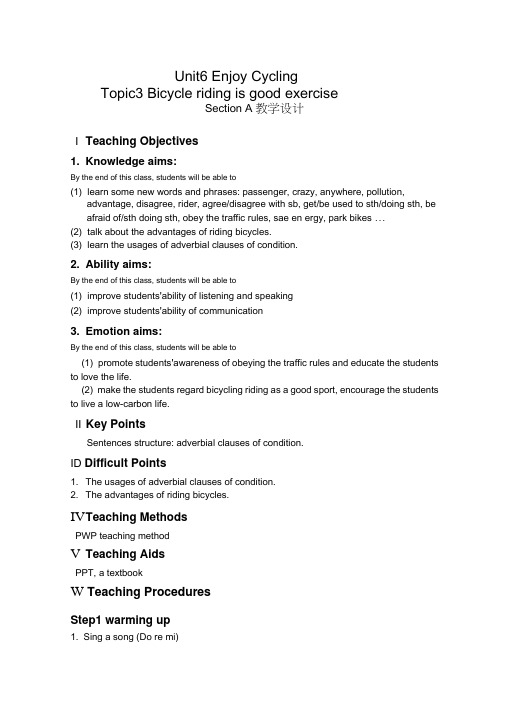
Unit6 Enjoy CyclingTopic3 Bicycle riding is good exerciseSection A 教学设计I Teaching Objectives1. Knowledge aims:By the end of this class, students will be able to(1) learn some new words and phrases: passenger, crazy, anywhere, pollution,advantage, disagree, rider, agree/disagree with sb, get/be used to sth/doing sth, be afraid of/sth doing sth, obey the traffic rules, sae en ergy, park bikes …(2) talk about the advantages of riding bicycles.(3) learn the usages of adverbial clauses of condition.2. Ability aims:By the end of this class, students will be able to(1) improve students'ability of listening and speaking(2) improve students'ability of communication3. Emotion aims:By the end of this class, students will be able to(1) promote students'awareness of obeying the traffic rules and educate the students to love the life.(2) make the students regard bicycling riding as a good sport, encourage the students to live a low-carbon life.II Key PointsSentences structure: adverbial clauses of condition.ID Difficult Points1. The usages of adverbial clauses of condition.2. The advantages of riding bicycles.IV T eaching MethodsPWP teaching methodV Teaching AidsPPT, a textbookW Teaching ProceduresStep1 warming up1. Sing a song (Do re mi)2. Daily reportThe purpose is to improve students'oral English and lead in the relative topic—bicycle riding is good exercise.Step2 Pre-listening1. New words lear ning. (passe nger, crazy, any where, polluti on, adva nta g e)The teacher presents the new words by using the pictures and creating relative satiations. (The new vocabulary input will make it easier for student when they listen to the conversation.)2. Discuss the picture about 1a. (The purpose is to make the students know some background information about the listening material.)Step3 While-listening1. Listen to the conversation and try to answer one question. (What are they talking about?) The purpose is to grasp the main idea of the conversation.2. Listen to the conversation again and mark T or F. (This step aims at making the students know some details about the conversation.)3. Listen to the conversation, and write down the advantages of the bicycle riding in their own words. (This step is mainly for improving students'language expression ability.)4. Watch a video, try to imitate the pronunciation and intonation. (This step is the preparation for their acting.)Step4 Post-listening1. Practice the conversation in groups, and then act it out. The purpose is to consolidate the conversation.2. Discussion (Group work)The students discuss the advantagesand disadvantagesof bicycle riding, and then give a report to the class. (This step is the final output of this lesson.)Step5 SummaryNew words and phrases:Passenger, crazy, anywhere, pollutionUseful expressions:If people obey the traffic rules, there will be fewer accidents.Cycling can help us save energy and it doesn 't cau.se air pollutionStep6 HomeworkWrite five sentences with if structure. And recite 1a. Preview for the next period.Step7 Blackboard designUnit6 Enjoy CyclingTopic3 Bicycle riding is good exerciseSecti on Apassenger, crazy, pollution, disagree atraffic accidentsave en ergy cause air polluti on obeythe traffic rulesbe。
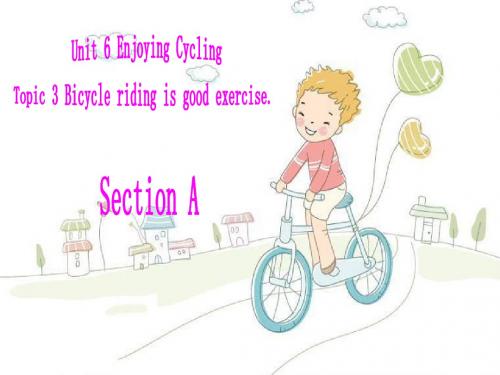
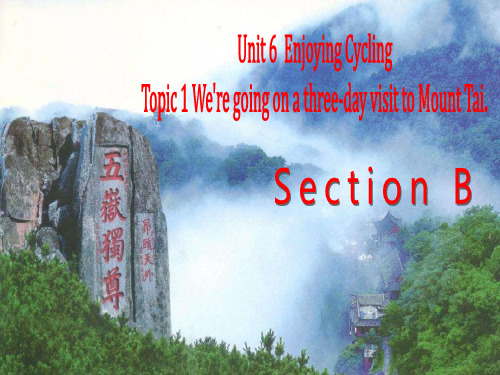
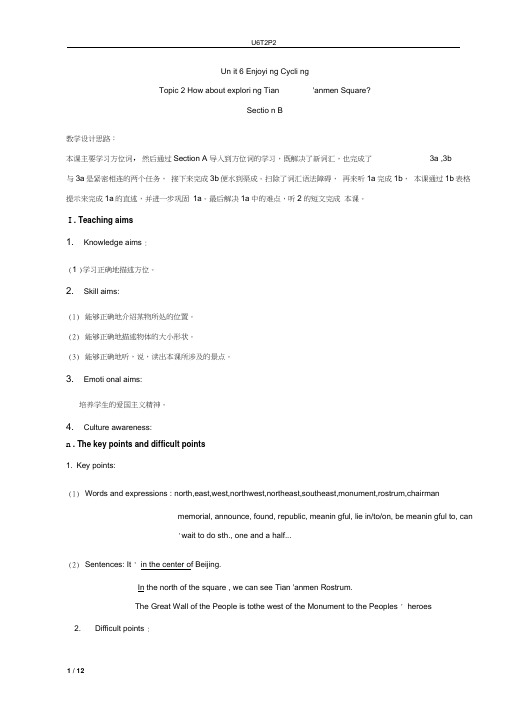
Un it 6 Enjoyi ng Cycli ngTopic 2 How about explori ng Tian 'anmen Square?Sectio n B教学设计思路:本课主要学习方位词,然后通过Section A 导入到方位词的学习,既解决了新词汇,也完成了3a ,3b与3a是紧密相连的两个任务,接下来完成3b便水到渠成。
扫除了词汇语法障碍,再来听1a完成1b,本课通过1b表格提示来完成1a的直述,并进一步巩固1a。
最后解决1a中的难点,听2的短文完成本课。
I . Teaching aims1. Knowledge aims :(1 )学习正确地描述方位。
2. Skill aims:(1)能够正确地介绍某物所处的位置。
(2)能够正确地描述物体的大小形状。
(3)能够正确地听,说,读出本课所涉及的景点。
3. Emoti onal aims:培养学生的爱国主义精神。
4. Culture awareness:n . The key points and difficult points1. Key points:(1)Words and expressions : north,east,west,northwest,northeast,southeast,monument,rostrum,chairmanmemorial, announce, found, republic, meanin gful, lie in/to/on, be meanin gful to, can'wait to do sth., one and a half...(2)Sentences: It ' in the center of Beijing.In the north of the square , we can see Tian 'anmen Rostrum.The Great Wall of the People is tothe west of the Monument to the Peoples ' heroes2. Difficult points :(1)正确运用in, to, on来表达方位。

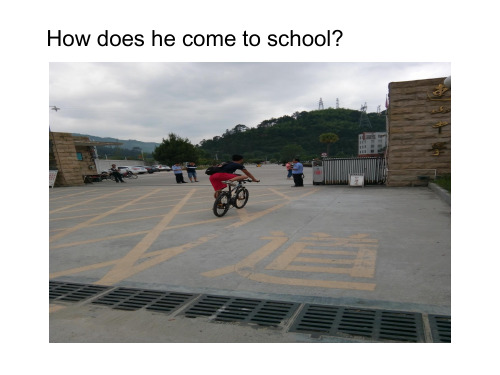
Unit 6 Enjoying Cycling Topic 1 We ' re going on a three -day visit to Mount Tai.Section AUnit 6 Enjoyi ng Cycli ngTopic 1 We'r e going on a three-day visit to Mount Tai.Section AI . Aims and demands1. Lear n some new words and phrases:field, vehicle, find out, task, airplane, airline, decide, total, raise, discuss2. Lear n the usages of infin itives:Boys and girls, I have some excit ing n ews to tell you!It' too far to cycle, but there are other vehicles for us to choose.It' hard to say.Kan gka ng and Michael, you two find out the cost to go by train.Hele n, your task is to find out the cost by bus.3. Talk about field trips.II. Teaching proceduresStep 11. T: Good morning, boys and girls.Ss: Good morning, Mrs. Wang!T: I'm glad to meet you here. I will have an En glish class for you . First ,I want to in troduce myself. My n ame is Wang Cuifeng. You can call me Mrs.Wan g. I come from Xixia, Wuliqiao Junior High School.2. Now we have learnt Unit 5. We know that different colors, en vir onments or other things can cause differe nt feeli ngs. Could you tell us what can make you happy?S1: Swim ming can make me happy.S2: Read ing can make me happyS3: Liste ning to music can make me happy.S4: Going to Beijing can make me happy. I 'like to go to Beijing.T: Do you want to know what can make me happy?Ss: …T: Going on a field trip ca n make me happy. I 'like to visit places ofin terest in other places.. Would you like to go on a visit with me?Ss: Y es.T: Now, here are some pictures about places of in terest. Please look at them. Do you know them?Ss: Mou nt Tai.T: Y es. Who went there? What do you know about it?…T: Mount Tai is very wonderful. If I 'm free, I 'like to go on a three-day visit to Mount Tai.Ask the Ss to talk about:⑴Do you want to travel to Mou nt Tai?⑵How would you like to go there?(3) W hich is the best way to go there?After the Ss an swer the three questi onsT: Look at these senten ces aga in. Pay atte ntio n to the red- colored parts. What are they?Ss: They …T: Nice work ! We call them i'hfinitives ”T: OK. Let ' go on a three-day visit to Mount Tai. But what areKan gka ng and his classmates going to do this mon th? Do you want to know? Let' beg in our new less on, Unit 6,Topic 1,Secti on A..3. Look at 1a.Can you see the picture? What are they talk ing about?4. Liste n to 1a and an swer the followi ng questi ons:1) Where are they going on a three-day visit?2) Will they cycle there? Why?5. Listen to 1a and mark T (True) or F (False).(1) For their sprin g field trip, they ' re going on-aayrvieit toMou nt Tai. ( )(2) lt will takethem a few days to get there by bus. ( )(3) Ka ngka ng and Michael will find the cost for the trai n. ( )(4) Hele n will find the cost for the pla ne. ( )(5) Miss Wang will decide on the best way to travel. ( )6. M atch the persons with their activities7 Read 1a and find out what you want to ask.1) Some new words2) Some importa nt phrases3) Some useful expressi ons4) Some sentences with infinitives (to do sth.)8.Write the questions down on the blackboard. Ask the students to findout the an swers by themselves.Step 21.. Discuss and solve these questi ons in groups.2. Ask some stude nts to show their an swers on the blackboard.3. Ask some stude nts to make evaluatio n for their an swers.4. Please read out some importa nt phrases and useful expressi ons.5. Please read out the sen ten ces with infin itives.6. Listen to the tape and read after it. Follow the tape. Pay attention tothe pronun ciati on and inton atio n.7. Read 1a in groups of five, and then I 'lask several groups to act it out.8. Fill in the blanks according to the dialog and then retell it.9. Please look at the pictures in 1b carefully. Discuss the best way toMount Tai in groups.T: How much does it cost to get to Mount Tai by airplane?Ss: It costs ¥ 700.T: How long does it take to go there by airpla ne?Ss: It takes one hour io go _ .T: How much does it cost to get to Mount Tai by train?Ss: It costs ¥ 145.T: How long does it take to go there by train?Ss: It takes 7 hours to go there.T: How much does it cost to get to Mount Tai by bus?Ss; It costs ¥ 200.T: How long does it take to go there by bus? Ss: It takes 8 hours to go there. T: How much does it cost to get to Mount Tai by bike? Ss: It costs ¥ 0.T: How long does it take to go there by bike?Ss: It takes two days to_ go T: Which is the best way to go to Mount Tai?G1:By trai n.G 2By train.G 3By train.T: Very good.10. T: Now, Look at the pictures in 3.Discuss which place is the best one to visit. Complete the table according to your coming trip and your partner ' s. Then ask and answer in pairs, paying attention to the structure “ to + V. ” .T: We'll make conversations about them. First, I'll give you anT: Well done! Now, let s check the answersthere.example. S i , you will be A and I willpictures. Are you ready?Example:A: Where do you plan to visi ?A: Why do you want to visit it?A: When are you going to start out?A: How will you get there?A: How much does it cost to get there?A: What do you think your trip will be like? be B. Let s discuss one of the B: I plan to visit Harbin. B: Because it ' s an interesting place. B: I plan to start out next month. B: By train. B: It costs about a hundred/uan. B:…Step 3Ask the students:T: Do you have any questions to ask?Help to solve the questions with others.The Ss may ask some questions like this:(1) How to tell the differences about “find, find out and look for ”.(2) How to use the word “decide”.Step 41. Write down the knowledge points of Section A. and let the students read them.2. Make exercises by the students according to the knowledge points..T; Make exercises by yourselves. If you finish your exercises, please give them to me .And then we will share them with each other.3. Give the students some exercises to do.4. A. Listen to the notice and complete the table.5. B. Listen again and tick what the children will do in the park.T: Well done! Now, let 's check the answers.6. I will give your exercises to do.Suppose you want to make a weekend-trip to the zoo near your home. Make conversations similar to 1a.Talk about the vehicles you would like to choose and the reason.7. Homework(1).Review the new words and useful expressions in Section A.(2). Plan your own trip to some places.(3). Preview the new lesson, Section B of Topic 1.(4). Let subject monitor make a summary of this lesson.T: Let 's stop here. Class is over. Goodbye!Blackboard layout:Section A☆ Words and phrases: field, proper, total, price☆ Useful expressions:How much does it cost to get to Mount Tai by…?It costs about a hundred yuan.How long does it take to go there by … ?☆ The infinitive: to + v. :plan to … , need to findout, it takes … to get to the best way to travel It 's too far to cycle.But it will take us a few days to get there by bike. I 'd loveto go by plane.。
英语预学导案备课活页课题Unit 6 Topic 3 Bicycle riding is good exercise. Section A授课教师: 时间:2017-4-25课标要求:能听懂接近自然语速,熟悉话题的简单语段,识别主题,获取主要信息并能在上述的口语活动中使用正确的语音,语调和能在教师的指导下参与角色表演等活动。
学习目标:1. 掌握本课的四会单词,重点词组以及重点句型2. 能够听懂1a并回答所设问题,能复述1a对话。
3. 学习if引导的条件状语从句,并复习时间状语从句。
预习案使用说明和学法指导:1.根据音标自学单词,读会并熟记并根据图片预测听力内容。
2.阅读理解对话并在文中勾画出生词和短语及句型,完成预习自测题目。
3.将预习中不能解决的问题或文中不懂的内容标注出来并写在“我的疑惑”处。
4 .20分钟独立完成。
Ⅰ预习导学:1)将本课的单词及汉意写在横线上单词:乘客_____________ 疯狂的__________ 任何地方_____________ 污染__________优点___________________ 不同意_______骑车的人_________________________短语:不同意某人_____________词型变换:pollution(v.)________ advantage(反义词)________disagree(反义词)_______ rider(v.)______2)你知道他们的意思吗?1.a traffic accident ___________________2.obey the traffic rules__________________________3. be afraid of doing sth.=be afraid to do sth.___________________4.be/get used to sth/doing sth.______________________5. used to do sth____________________6.cause air pollution____________________ Ⅱ预习自测根据句意及首字母,音标,汉语提示完成句子.1. There are twenty _____________(乘客) in the bus.2. Cycling is popular because it doesn’t cause airp .3.One of the ________(优点) of cycling is saving energy.4. He must be c_____to drive so fast.It’s so dangerous.5.Where is my watch? I can’t find it_____['eniweə(r)]. Ⅲ我的疑惑:请将预习中不能解决的问题写下来。
----------------------------------------------------学 导 流 程 案Everyday English : If people obey the traffic rules, there will be fewer accidents. 旧知识回顾: 复习时间状语从句6)Read 1a and translate , point out difficult sentences and deal with them. Retell 1a.(训练口语,从而加深对课文的理解。
4分)Step 3 【听说巩固,合作探究】1) Listen to the passage and fill in the blanks. (3分) (巩固1a,训练听力能力。
)2) Talk about the following pictures in groups and complete the sentences. (复习巩固时间状语从句。
5分)Step4:课堂小结:本节课你们都学到了什么? (2分)Step5【课堂检测,巩固提升】(3分)教 学 流 程Step1 【创设情景,出示目标】1)Read the teaching aims (明确学习任务和目标,2分钟) 2) (创设情景,创造轻松的学习氛围,导入新课.2分)Step2 【自主探究,互动质疑】 1)Learn new words.(8分)2)Work in groups and discuss the advantages and disadvantages of ridingbikes. (为导入1a 做准备 。
2分)3)Listen to 1a and finished 1b.(3分)4)Read 1a and complete 1c.(3分)5)Work alone &Group Work: 自学新知识储备,小组讨论课文重点并汇报.(自学群学独立解决问题的能力和小组的合作能力以及对知识点理解和运用能力。
8分)新知识储备达标检测探究Ⅰ:重点句型:1.Many passengers were hurt.知识链接:be hurt= get hurt 受伤He _________ ______yesterday, I took him to the hostipal.2.I think traffic in Beijing is crazy.我认为北京的交通非常拥堵。
知识链接:crazy“拥挤的”=heavy=busy=terrible拓展:be crazy about 着迷于……,热衷于……(后接名词、动名词及人称代词)e.g. She is crazy about English. 她喜欢英语。
The little boy is crazy about_______________(play) the piano.你的句子:__________________________________________________3.When I first arrived, I was afraid of riding my bike anywhere.知识链接:anywhere在肯定句中意为“无论何处,随便哪里”。
拓展:anywhere多用于疑问句和否定句中,意为“什么地方”。
Did you go __________ interesting?4.But now I feel a little more confident.知识链接:a little more confident更自信一点拓展:a little+比较级……….一点e.g.He is _____ ______ ______(高点儿) than me.5.Cycling can help us save energy and it doesn’t cause air pollution.知识链接:cause air pollution 造成空气污染拓展:pollution(n.)—pollute(v.)Litter_______ our rivers and caused water_______.6.I disagree with you.知识链接:disagree with sb.不同意某人,与某人的意见不一致。
拓展:disagree(反义词)agree7.Many people around the world use bicycles for walking and pleasure.世界各地很多人用自行车散步和娱乐。
知识链接:use sth. for doing sth.=use sth. to do sth. 用…做某事We can use mobile phones for_____________(take) photos now.探究II: 重点语法:If people obey the traffic rules, there will be fewer accidents.如果人们遵守交通规则,交通事故就会减少。
知识链接:obey the traffic rules遵守交通规则(1)此句是if引导的条件状语从句。
if意为“如果,要是,假如,倘若”(2)由if引导的条件状语从句,“主将从现,主祈从现,主情从现”。
1. e.g. If it snows tomorrow, we will make snowmen together.If the weather ______(get)warm, we will have a picnic .2 .e.g. Please ring me up if you want to go with me.Let’s play basketball if it ______(be) sunny tomorrow.3. e.g.If you are ill, you must go to see a doctor.If it _______(rain) tomorrow, we had better stay at home. 一.单项选择:( )1. ____ it rains, we will stay at home.A. WhenB. BecauseC. ThoughD.If( )2.Shall we go to the zoo tomorrow?Let’s go there if it__________.A.doesn’t rainB.will rainC.rainsD.won’t rain( )3. Jack is a little ____ than Peter.A. strongB. strongerC. strongestD. the strongest( )4.You can save money if you_____buy cheaper things.A.will buyB.buyC.boughtD.are buying( )5.You’d better cycle there because ____easy to park your bike. A.it is B.this is C.that is D.you are( )6.-Tom isn’t a good boy. He isn’t interested in study.-______He is kind and helpful.A.I agree with.B.I disagree with you.C.Of course.D.Of course not.( )7.If you are more careful, you will make_____mistakes (错误) A.little B.few C.less D.fewer二.翻译句子1. Jeff到处找他的钢笔,但哪儿(anywhere)都找不到_________________________________________________2. 工厂和汽车导致空气污染。